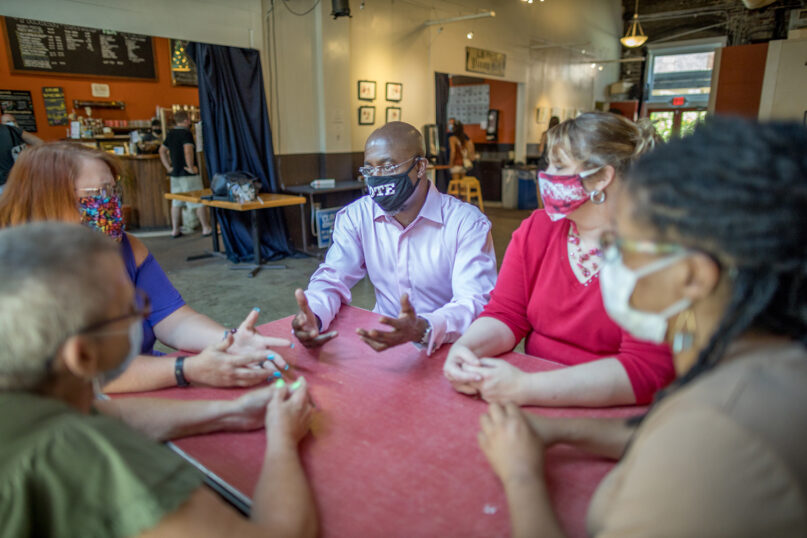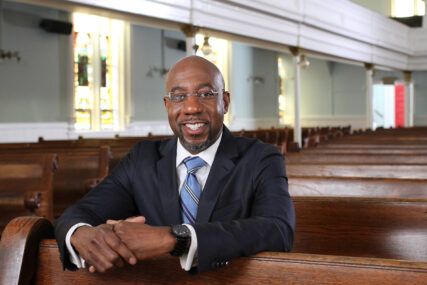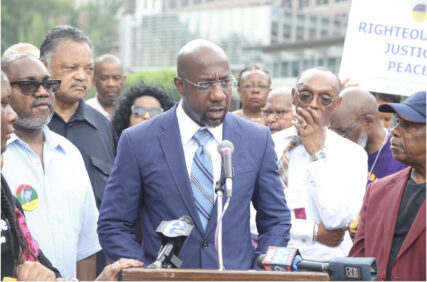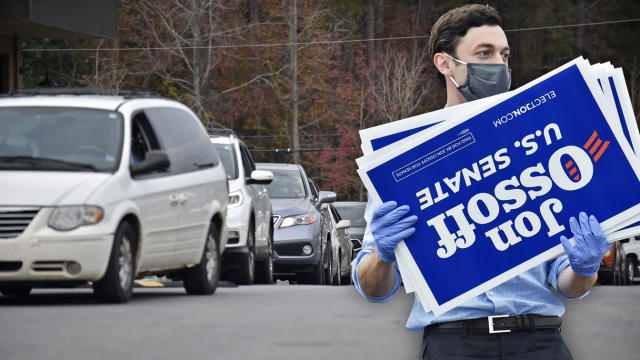Crystal Hill·Reporter
Wed, November 25, 2020
The Trump campaign has repeatedly attempted to use the judicial system to overturn the president’s defeat to President-elect Joe Biden, filing more than two dozen unsuccessful lawsuits since Election Day.
But the president’s campaign now finds itself on the other side of a legal case in a newly filed federal lawsuit alleging that it violated the Voting Rights Act of 1965 when it sought to “disenfranchise hundreds of thousands of voters,” particularly African Americans in metropolitan areas of Michigan.
“It’s not even about the success of President Trump and the Trump campaign’s attempts to overturn the election,” Monique Lin-Luse, assistant counsel of the NAACP Legal Defense and Education Fund, which filed the lawsuit, told Yahoo News. “The very attempt ... to overturn it by disenfranchising and de-legitimizing Black voters is what we believe is unlawful, and it's also dangerous and corrosive to our democracy.”
President Trump at the White House on Tuesday. (Susan Walsh/AP)
The lawsuit, filed Friday in a Washington, D.C., federal court, was brought on behalf of the Michigan Welfare Rights Organization and three Detroit residents over Trump’s apparent efforts to sway local officials in Wayne County, Mich., and state legislators to hold off on certifying votes or interfere in the electoral process.
President Trump met with Michigan House Speaker Lee Chatfield and Senate Majority Leader Mike Shirkey at the White House on Friday in what was viewed as an attempt by Trump to convince the GOP legislators to cooperate with a plan to override the will of voters in Michigan.
The lawmakers said after the meeting that they intend to “follow the law” regarding the selection of Michigan’s electors. Shirkey told the Associated Press that Trump talked about Michigan election results with them, but added that the meeting was harmless, the AP reported Tuesday.
Shirkey confirms to @AP Trump talked about Mich. election results with GOP delegation. He says at 1 point, Trump got Giuliani to call in & Giuliani repeated the Wayne County allegations he had raised in a news conference last Thursday. Shirkey says meeting was 'innocuous'
— David Eggert (@DavidEggert00) November 24, 2020
In Wayne County, Trump reportedly tried to pressure the two Republican members — Monica Palmer and William Hartmann — of the county’s four-person Board of Canvassers not to certify the results of the election there.
Palmer and Hartmann initially voted against certification, sparking outrage on social media, then backtracked and voted to certify the results. The AP reported that the president then personally called the two officials, after which they filed affidavits seeking to rescind their certification, which can’t be done, court records show.
“During the meeting, one of the Republican Canvassers said she would be open to certifying the rest of Wayne County (which is predominately white) but not Detroit (which is predominately Black),” the complaint said.
The lawsuit also cites a press conference last Thursday in Washington, during which Rudy Giuliani, one of Trump’s lawyers, claimed without evidence that the campaign had identified 300,000 illegitimate ballots.
“These ballots were all cast in Detroit,” Giuliani said, according to the complaint. “It changes the result of the election in Michigan, if you take out Wayne County.”
The case points to several tweets from Trump alleging fraud in Detroit. “Voter Fraud in Detroit is rampant, and has been for many years,” Trump tweeted on Nov. 19.
In Detroit, there are FAR MORE VOTES THAN PEOPLE. Nothing can be done to cure that giant scam. I win Michigan!
— Donald J. Trump (@realDonaldTrump) November 18, 2020
Yahoo News sent an email to the Trump campaign seeking comment, and court records don’t yet list an attorney in this particular case. NPR reported Tuesday that the campaign denied going after Black voters. Senior legal adviser Jenna Ellis told the station that their only goal is “to ensure safe, secure and fair elections.”
The Michigan Board of State Canvassers voted Monday to certify the state’s election results, after days of speculation over whether outside influence from Trump’s campaign or false allegations of voter fraud would complicate a fairly routine process. Black people account for roughly 39 percent of the population in Wayne County, the largest county in the state, which includes Detroit, according to the most recent census data. Biden won there by more than a 2-1 margin, and won the state by more than 150,000 votes.
The civil case goes beyond Michigan, alleging a strategy from the Trump campaign to disenfranchise voters in cities with large swaths of Black voters.

The lawsuit, filed Friday in a Washington, D.C., federal court, was brought on behalf of the Michigan Welfare Rights Organization and three Detroit residents over Trump’s apparent efforts to sway local officials in Wayne County, Mich., and state legislators to hold off on certifying votes or interfere in the electoral process.
President Trump met with Michigan House Speaker Lee Chatfield and Senate Majority Leader Mike Shirkey at the White House on Friday in what was viewed as an attempt by Trump to convince the GOP legislators to cooperate with a plan to override the will of voters in Michigan.
The lawmakers said after the meeting that they intend to “follow the law” regarding the selection of Michigan’s electors. Shirkey told the Associated Press that Trump talked about Michigan election results with them, but added that the meeting was harmless, the AP reported Tuesday.
Shirkey confirms to @AP Trump talked about Mich. election results with GOP delegation. He says at 1 point, Trump got Giuliani to call in & Giuliani repeated the Wayne County allegations he had raised in a news conference last Thursday. Shirkey says meeting was 'innocuous'
— David Eggert (@DavidEggert00) November 24, 2020
In Wayne County, Trump reportedly tried to pressure the two Republican members — Monica Palmer and William Hartmann — of the county’s four-person Board of Canvassers not to certify the results of the election there.
Palmer and Hartmann initially voted against certification, sparking outrage on social media, then backtracked and voted to certify the results. The AP reported that the president then personally called the two officials, after which they filed affidavits seeking to rescind their certification, which can’t be done, court records show.
“During the meeting, one of the Republican Canvassers said she would be open to certifying the rest of Wayne County (which is predominately white) but not Detroit (which is predominately Black),” the complaint said.
The lawsuit also cites a press conference last Thursday in Washington, during which Rudy Giuliani, one of Trump’s lawyers, claimed without evidence that the campaign had identified 300,000 illegitimate ballots.
“These ballots were all cast in Detroit,” Giuliani said, according to the complaint. “It changes the result of the election in Michigan, if you take out Wayne County.”
The case points to several tweets from Trump alleging fraud in Detroit. “Voter Fraud in Detroit is rampant, and has been for many years,” Trump tweeted on Nov. 19.
In Detroit, there are FAR MORE VOTES THAN PEOPLE. Nothing can be done to cure that giant scam. I win Michigan!
— Donald J. Trump (@realDonaldTrump) November 18, 2020
Yahoo News sent an email to the Trump campaign seeking comment, and court records don’t yet list an attorney in this particular case. NPR reported Tuesday that the campaign denied going after Black voters. Senior legal adviser Jenna Ellis told the station that their only goal is “to ensure safe, secure and fair elections.”
The Michigan Board of State Canvassers voted Monday to certify the state’s election results, after days of speculation over whether outside influence from Trump’s campaign or false allegations of voter fraud would complicate a fairly routine process. Black people account for roughly 39 percent of the population in Wayne County, the largest county in the state, which includes Detroit, according to the most recent census data. Biden won there by more than a 2-1 margin, and won the state by more than 150,000 votes.
The civil case goes beyond Michigan, alleging a strategy from the Trump campaign to disenfranchise voters in cities with large swaths of Black voters.
A drive-by rally to certify the presidential election results in Lansing, Mich., on Nov. 14.
(Paul Sancya/AP)
“President Trump and his campaign have repeatedly — and falsely — raised the specter of widespread fraud in Detroit and other cities with large Black populations, including Philadelphia, Milwaukee and Atlanta, in an effort to suggest votes from those cities should not be counted,” the complaint says.
Court records show that the case was assigned Tuesday to Judge Emmet Sullivan, the same judge who presided over the criminal case against former White House national security adviser Michael Flynn and who in early November ordered the U.S. Postal Service to sweep facilities in states including Georgia and Michigan to ensure that mail-in ballots were delivered.
The new lawsuit asks the court to declare that Trump’s campaign engaged in conduct that violated the Voting Rights Act and seeks to prohibit the campaign, and anyone acting in concert or on its behalf, from “continuing to exert pressure on state or local officials to disenfranchise Plaintiffs or other Black voters by not certifying the results of the November 2020 election, or by appointing an unlawful slate of electors that disenfranchises Plaintiffs or other Black voters.”
“To cast doubt on the election & to use Black ppl as a vehicle for that doubt is one of the most destructive ways to handle defeat in an election.” -@JNelsonLDF on Trump’s odious maligning of the integrity of ballots cast by Black voters. @allinwithchris pic.twitter.com/SCBrszs22G
— Sherrilyn Ifill (@Sifill_LDF) November 25, 2020
Kristen Clarke, president and executive director of the Lawyers’ Committee for Civil Rights Under Law, told Yahoo News that voter suppression is “alive and well” in the country. “What’s different about this,” she said, “is that this may mark the first time in recent history when we've seen a voter suppression effort orchestrated by a sitting president, that aimed to cancel out the votes of black voters on a massive and unprecedented scale.”
The lawsuit also raises the question of what, if any, consequences the Trump campaign and its allies could face in court for the state and federal civil cases they’ve filed that have yet to produce credible claims or evidence of widespread voter fraud.
“I think that a court could discourage frivolous litigation,” Justin Levitt, an elections expert and professor at Loyola Marymount University, told Yahoo News via email. “But it’s extremely unlikely that a court not presently hearing the litigation will be the court to engage.”
In other words, any sanctions against the Trump campaign in court would most likely come from a judge in one of the campaign’s election cases. Generally, sanctions are pursued by one of the parties, who files a motion detailing as much and a judge eventually rules on whether to grant it. Sanctions can include requiring the plaintiff to pay legal fees for the defendant.

“President Trump and his campaign have repeatedly — and falsely — raised the specter of widespread fraud in Detroit and other cities with large Black populations, including Philadelphia, Milwaukee and Atlanta, in an effort to suggest votes from those cities should not be counted,” the complaint says.
Court records show that the case was assigned Tuesday to Judge Emmet Sullivan, the same judge who presided over the criminal case against former White House national security adviser Michael Flynn and who in early November ordered the U.S. Postal Service to sweep facilities in states including Georgia and Michigan to ensure that mail-in ballots were delivered.
The new lawsuit asks the court to declare that Trump’s campaign engaged in conduct that violated the Voting Rights Act and seeks to prohibit the campaign, and anyone acting in concert or on its behalf, from “continuing to exert pressure on state or local officials to disenfranchise Plaintiffs or other Black voters by not certifying the results of the November 2020 election, or by appointing an unlawful slate of electors that disenfranchises Plaintiffs or other Black voters.”
“To cast doubt on the election & to use Black ppl as a vehicle for that doubt is one of the most destructive ways to handle defeat in an election.” -@JNelsonLDF on Trump’s odious maligning of the integrity of ballots cast by Black voters. @allinwithchris pic.twitter.com/SCBrszs22G
— Sherrilyn Ifill (@Sifill_LDF) November 25, 2020
Kristen Clarke, president and executive director of the Lawyers’ Committee for Civil Rights Under Law, told Yahoo News that voter suppression is “alive and well” in the country. “What’s different about this,” she said, “is that this may mark the first time in recent history when we've seen a voter suppression effort orchestrated by a sitting president, that aimed to cancel out the votes of black voters on a massive and unprecedented scale.”
The lawsuit also raises the question of what, if any, consequences the Trump campaign and its allies could face in court for the state and federal civil cases they’ve filed that have yet to produce credible claims or evidence of widespread voter fraud.
“I think that a court could discourage frivolous litigation,” Justin Levitt, an elections expert and professor at Loyola Marymount University, told Yahoo News via email. “But it’s extremely unlikely that a court not presently hearing the litigation will be the court to engage.”
In other words, any sanctions against the Trump campaign in court would most likely come from a judge in one of the campaign’s election cases. Generally, sanctions are pursued by one of the parties, who files a motion detailing as much and a judge eventually rules on whether to grant it. Sanctions can include requiring the plaintiff to pay legal fees for the defendant.
Trump lawyer Rudy Giuliani speaking at the Republican National Committee headquarters last week. (Jacquelyn Martin/AP)
Last week, lawyers for the city of Detroit sought sanctions against the Trump campaign’s counsel in federal court in the form of striking from the record the two affidavits submitted by Hartmann and Palmer in Wayne County in a federal lawsuit and a voluntary motion to dismiss from the campaign that falsely said the county declined to certify the results of the election, court records show.
“The affidavits and the text in the notice were submitted for an improper purpose: to make a gratuitous, public statement about their purported reason for voluntary dismissal, before the court could reject their baseless claims of election fraud,” the Nov. 19 legal filing said.
Clarke said that in one of the now-dismissed cases involving Maricopa County, Ariz., the judge essentially invited the county to seek to recoup legal fees from the campaign. An example, she said, of a court finding the campaign’s conduct to be “irresponsible and inappropriate.”
“Some [courts] have been making quite clear that they find the claims meritless, and if the meritless litigation continues, defendants may well seek sanctions in the cases where they are sued,” Levitt said.
Legal and elections experts have for weeks stressed to Yahoo News and other news outlets that the Trump campaign’s unsubstantiated allegations of fraud and voter irregularities will only serve to undermine voters’ confidence in the electoral process.
“They’re frivolous in the sense that the legal claims are baseless,” Clarke said. “They’re not frivolous to the extent that we have a sitting president who's placed a target on the backs of Black voters. It’s hard to ignore the grim racial reality driving this effort.”
_____
The 2020 election wasn’t ‘stolen.’ Here are all the facts that prove it.
Last week, lawyers for the city of Detroit sought sanctions against the Trump campaign’s counsel in federal court in the form of striking from the record the two affidavits submitted by Hartmann and Palmer in Wayne County in a federal lawsuit and a voluntary motion to dismiss from the campaign that falsely said the county declined to certify the results of the election, court records show.
“The affidavits and the text in the notice were submitted for an improper purpose: to make a gratuitous, public statement about their purported reason for voluntary dismissal, before the court could reject their baseless claims of election fraud,” the Nov. 19 legal filing said.
Clarke said that in one of the now-dismissed cases involving Maricopa County, Ariz., the judge essentially invited the county to seek to recoup legal fees from the campaign. An example, she said, of a court finding the campaign’s conduct to be “irresponsible and inappropriate.”
“Some [courts] have been making quite clear that they find the claims meritless, and if the meritless litigation continues, defendants may well seek sanctions in the cases where they are sued,” Levitt said.
Legal and elections experts have for weeks stressed to Yahoo News and other news outlets that the Trump campaign’s unsubstantiated allegations of fraud and voter irregularities will only serve to undermine voters’ confidence in the electoral process.
“They’re frivolous in the sense that the legal claims are baseless,” Clarke said. “They’re not frivolous to the extent that we have a sitting president who's placed a target on the backs of Black voters. It’s hard to ignore the grim racial reality driving this effort.”
_____
The 2020 election wasn’t ‘stolen.’ Here are all the facts that prove it.

















